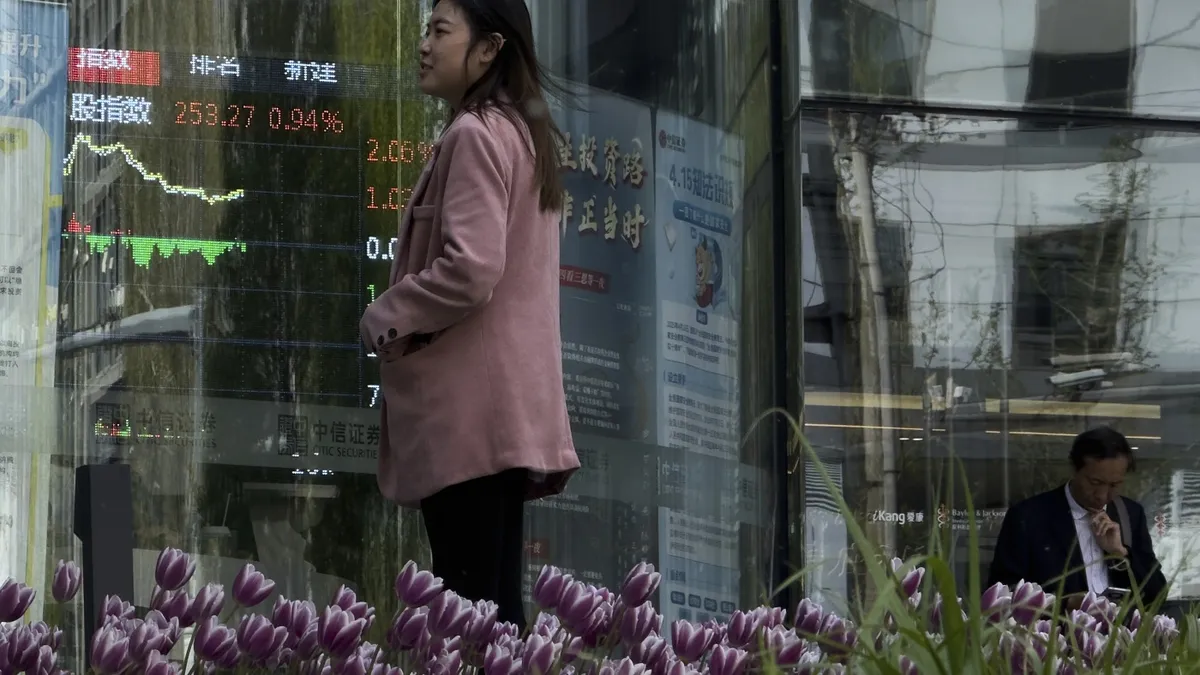
In a decisive move, China retaliated on Friday against the increased tariffs imposed by the United States, instituting a staggering 125% tariff on a range of U.S. goods. However, the Chinese government signaled that it would refrain from implementing further retaliatory measures in the future. The Ministry of Finance in China released a statement indicating that if the U.S. continues to escalate tariffs on Chinese exports, they will not respond further, suggesting that Chinese officials perceive no additional benefits from continuing the tit-for-tat tariff exchanges.
The Chinese statement elaborated on the current trade dynamics, asserting that due to the existing tariffs, U.S. goods exported to China have become "no longer market-viable." This significant tariff increase has led to a turbulent day in Asian markets, which closed with a mixed outlook. Just prior to the announcement, Japan's Nikkei index fell nearly 3%, while South Korea's Kospi dropped by 0.5%. Conversely, Taiwan's composite index surged nearly 3%, and Hong Kong's Hang Seng Index rose by 1.3%, reflecting varied investor sentiment.
Following the announcement from Beijing, European markets initially opened higher but quickly dipped into negative territory. Major indices in London, Frankfurt, and Paris experienced downward trends shortly after the news broke. Additionally, U.S. futures, which forecast the likely performance of key exchanges including the Nasdaq, S&P 500, and the Dow Jones Industrial Average, began to decline in anticipation of the U.S. trading session.
The mixed trading patterns came on the heels of losses on Wall Street the previous Thursday. Initial optimism regarding President Trump's temporary suspension of higher global tariffs has since waned. Analysts from the Australian bank ANZ expressed concerns that ongoing volatility in trade policies is undermining investor and policymaker confidence, ultimately exerting downward pressure on global economic activity and investment in the near term.
In a further clarification from the White House, it was noted that China now faces a cumulative tariff rate of 145% on its exports to the U.S., factoring in a pre-existing 20% tax. This staggering figure has intensified fears regarding the potential deterioration of the U.S.-China trade relationship. However, some economic analysts argue that the specific tariff rates have become almost irrelevant. The consensus is that with tariffs set at such high levels, further increases—whether to 300% or beyond—are unlikely to have a meaningful impact.
Victor Gao, a scholar with the Beijing-based think tank the Center for China and Globalization, warned that the current trajectory of tariffs could lead to a complete halt in China-U.S. trade within weeks. He emphasized the need for the U.S. to demonstrate flexibility and engage with China "with decency and dignity" to avoid further escalation of tensions.
Amidst the escalating trade conflict with the U.S., China is actively seeking to bolster its relationships with other regional economic players. Senior finance and central bank officials from China, Japan, and South Korea convened recently to discuss the implications of U.S. tariffs, as highlighted in a statement from China’s central bank.
Additionally, President Xi Jinping is scheduled to visit Vietnam, Malaysia, and Cambodia next week, signaling an intention to strengthen ties with Asian trading partners amid a fracturing relationship with the U.S. These nations are now faced with a delicate balancing act, aiming to maintain their relations with Beijing while avoiding the ire of Washington.
In response to the high U.S. tariffs imposed this month, several Southeast Asian countries, including Vietnam, have expressed a desire to negotiate with the Trump administration. Notably, Vietnam even proposed slashing tariffs on U.S. imports to zero, a move that has yet to satisfy U.S. officials. Accusations have arisen that Vietnam is allowing Chinese products to be routed through its borders to evade tariffs, which could complicate their trade negotiations further.
As Vietnam prepares to intensify its crackdown on Chinese goods being shipped to the U.S., it is also tightening controls on sensitive exports to China. The outcome of these developments will be crucial for the future of trade relations in the region.